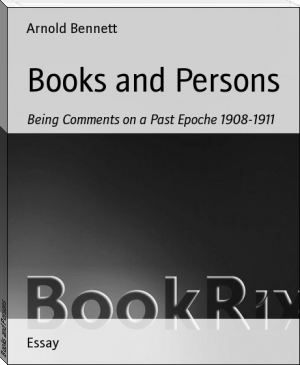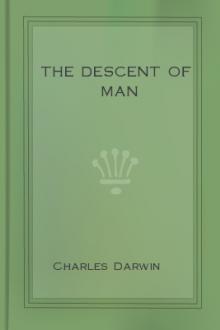Books and Persons - Arnold Bennett (phonics readers .TXT) 📗

- Author: Arnold Bennett
Book online «Books and Persons - Arnold Bennett (phonics readers .TXT) 📗». Author Arnold Bennett
less than usual. I positively looked forward to reading Montaigne. Yet when the first night in a little French hotel arrived, and I had perched the candle on the top of the ewer on the night-table in order to get it high enough, I discovered that instead of Montaigne I was going to read a verbatim account of a poisoning trial in the Paris _Journal_. That is about three weeks ago, and I have not yet opened my Montaigne. I have, however, talked enthusiastically to sundry French people about Montaigne, and explained to them that Florio's translation is at least equal to the original, and that Montaigne is truly beloved and understood in England alone.
* * * * *
It was on the second day of my holiday, in another small provincial town in Central France, where I was improving my mind and fitting myself for cultured society in London by the contemplation of cathedrals, that I came across, in a draper's and fancy-ware shop, a remaindered stock of French fiction, at 4-1/2d. the volume. Among these, to my intense disgust, was a translation of a little thing of my own, and also a collection of stories by Leonide Andreief, translated by Serge Persky, and published by _Le Monde Illustre_. Although I already possessed, in Montaigne, sustenance for months, I bought this volume, and at once read it. A small book by Andreief, "The Seven that were Hanged," was published in England--last year, I think--by Mr. Fifield. It received a very great deal of praise, and was, in fact, treated as a psychological masterpiece. I was disappointed with it myself, for the very simple reason that I found it tedious. I had difficulty in finishing it. I gather that Andreief has a great reputation in Russia, sharing with Gorky the leadership of the younger school. Well, I don't suppose that I shall ever read any more Gorky, who has assuredly not come up to expectations. There are things among the short stories of Andreief (the volume is entitled "Nouvelles") which are better than "The Seven that were Hanged." "The Governor," for example, is a pretty good tale, obviously written under the influence of Tolstoy's "Death of Ivan Ilyitch"; and a story about waiting at a railway station remains in the mind not unpleasantly. But the best of the book is second-rate, vitiated by diffuseness, imitativeness, and the usual sentimentality. Neither Andreief nor Gorky will ever seriously count. Neither of them comes within ten leagues of the late Anton Tchehkoff. I think there must be young novelists alive in Russia who are superior to these two alleged leaders. I have, in fact, heard talk of one Apoutkine, in this country of France, and I am taking measures to read him.
* * * * *
When at length I settled down in a small hotel in a village on the farther coast of Brittany, I had read nothing but Andreief and criminal processes. Nobody else in the hotel, save one old lady, read anything but criminal processes. It is true that it was a sadly vulgar hotel. My fellow-guests were mainly employees who had escaped for a fortnight from the big Paris shops. In particular there was a handsome young woman from the fur department of the Grands Magasins du Louvre, who (weather permitting) spent half her morning in a kimono at her bedroom window while her husband (perfumery department) discussed patriotism and feminism in the cafe below. When I remember the spectacle, which I have often seen, of the staff of the Grands Magasins du Louvre trooping into its prison at 7.30 a.m. to spend a happy day of eleven and a half hours in humouring the whims of the great shopping classes, I was charmed to watch this handsome and vapid creature idling away whole hours at her window and enjoying the gaze of persons like myself. She never read. Once when I had a bit of a discussion with her husband at lunch upon an intellectual matter, she got up and walked away with an impatient gesture of disdain, as if to say: "What has all this got to do with Love?" Her husband never read, either. Their friends did not read, not even newspapers. But another couple had an infant, aged three, and this infant had a rather fierce grandmother, and this grandmother read a great deal. She and I alone stood for literature. She would stay at home with the infant while the intermediate generation was away larking. She was always reading the same book. It was a thick book, with a glossy coloured cover displaying some scene in which homicide and passion were mingled; its price, new, was sixpence halfpenny, and its title was simply and magnificently, "Borgia!" with a note of exclamation after it. She confined herself to "Borgia!" She was tireless with "Borgia!" She went home to Paris reading "Borgia!" It was a shocking hotel, so different from the literary hotels of Switzerland, Bournemouth, and Scarborough, where all the guests read Meredith and Walter Pater. I ought to have been ashamed to be seen in such a place. My only excuse is that the other two hotels in the remote little village were just as bad, probably worse.
THE BRITISH ACADEMY OF LETTERS
[Sidenote:_18 Aug. '10_]
A correspondent writes angrily to me because I have not written angrily about the list of authors recently put forward as Academicians of the proposed new British Academy of Letters. The fact is that the entire scheme of the British Academy of Letters had a near shave of escaping my attention altogether. I only heard of it by accident, being away on a holiday in a land where they have had enough of academies. But for the miracle of a newspaper found on a fishing-boat I might not have even known what on earth my correspondent was raging about. In literary circles such as mine the new British Academy of Letters has not been extensively advertised. In the main I agree with my correspondent's criticisms of the list. But I must say that his ire shows a certain naivete. None but a young and trustful man could have expected the list to be otherwise than profoundly and utterly grotesque. A list of creative artists that did not suffer acutely from this defect could only be compiled by creative artists themselves. Not all, and not nearly all, creative artists would be qualified to sit on the compiling committee, but nobody who was not a creative artist would be qualified. The rest of the world has no sure ground of judgment, for the true critical faculty is inseparable from the creative. The least critical word of the most prejudiced and ignorant creative artist is more valuable than whole volumes writ by dilettanti of measureless refinement and erudition. I am not aware of the identity of the persons who sat down together and compiled the pleasing preliminary list of twenty-seven academicians, but I am perfectly certain that the predominant among them were not original artists. The artist, at the present stage of social evolution, would as soon think of worrying himself about the formation of an academy, as of putting up for the St. Pancras Borough Council. He has something else to do. He fears the deadly contacts with those prim, restless, and tedious dilettanti. And of course he knows that academies are the enemies of originality and progress.
* * * * *
That list was undoubtedly sketched out by a coterie of dilettanti. London swarms with the dilettanti of letters. They do not belong to the criminal classes, but their good intentions, their culture, their judiciousness, and their infernal cheek amount perhaps to worse than arson or assault. Their attitude towards the creative artist is always one of large, tolerant pity. They honestly think that if only the artist knew his business as they know his business, if only he had their discernment and impartiality, and if only he wasn't so confoundedly ignorant and violent--how different he would be, how much nicer and better, how much more effective! They are eternally ready to show an artist where he is wrong and what he ought to do in order to obtain their laudations unreserved. In a personal encounter, they will invariably ride over him like a regiment of polite cavalry, because they are accustomed to personal encounters. They shine at tea, at dinner, and after dinner. They talk more easily than he does, and write more easily too. They can express themselves more readily. And they know such a deuce of a lot. And they can balance pros and cons with astonishing virtuosity. The Press is their washpot. And they are influential in other places. They can get pensions for their favourites. They know the latest methods of pulling an artichoke to pieces. And they will say among themselves, forgiving but slightly pained: "Yes, he's written a very remarkable novel, but he doesn't know how to eat an artichoke." They would be higher than the angels were it not for the fact that, in art, they are exquisitely and perfectly footling. They cannot believe this, the public cannot believe it. Nevertheless, every artist knows it to be true. They have never done anything themselves except fuss around.
* * * * *
As for us, we are their hobby. And since unoriginality is their most striking characteristic, some of us are occasionally pretty nearly hobbied to extinction by them. In every generation they select some artist, usually for reasons quite unconnected with art, and put him exceedingly high up in a niche by himself. And when you name his name you must hush your voice, and discussion ends. Thus in the present generation, in letters, they have selected Joseph Conrad, a great artist, but not the only artist on the island. When Conrad is mentioned they say, "Ah, Conrad!" and bow the head. And in the list, compiled presumably to represent what is finest in English literature at an epoch when the novel is admittedly paramount, there are half a dozen of everything except novelists. There is only one practising novelist, and he is not an Englishman. I said a moment ago that the most striking characteristic of the dilettanti is unoriginality. But possibly a serene unhumorousness runs it close.
* * * * *
The master-thought at the bottom of this scheme is not an Academy of British Letters for literary artists, but an Academy of British Letters for literary dilettanti. A few genuine artists, if the scheme blossoms, will undoubtedly be found in it. But that will be an accident. Some of the more decorative dilettanti have had a vision of themselves as academicians. Hence the proposal for an academy. In the public mind dilettanti are apt to be confused with artists. Indeed, the greater the artist, the more likely the excellent public is to regard him as a sort of
* * * * *
It was on the second day of my holiday, in another small provincial town in Central France, where I was improving my mind and fitting myself for cultured society in London by the contemplation of cathedrals, that I came across, in a draper's and fancy-ware shop, a remaindered stock of French fiction, at 4-1/2d. the volume. Among these, to my intense disgust, was a translation of a little thing of my own, and also a collection of stories by Leonide Andreief, translated by Serge Persky, and published by _Le Monde Illustre_. Although I already possessed, in Montaigne, sustenance for months, I bought this volume, and at once read it. A small book by Andreief, "The Seven that were Hanged," was published in England--last year, I think--by Mr. Fifield. It received a very great deal of praise, and was, in fact, treated as a psychological masterpiece. I was disappointed with it myself, for the very simple reason that I found it tedious. I had difficulty in finishing it. I gather that Andreief has a great reputation in Russia, sharing with Gorky the leadership of the younger school. Well, I don't suppose that I shall ever read any more Gorky, who has assuredly not come up to expectations. There are things among the short stories of Andreief (the volume is entitled "Nouvelles") which are better than "The Seven that were Hanged." "The Governor," for example, is a pretty good tale, obviously written under the influence of Tolstoy's "Death of Ivan Ilyitch"; and a story about waiting at a railway station remains in the mind not unpleasantly. But the best of the book is second-rate, vitiated by diffuseness, imitativeness, and the usual sentimentality. Neither Andreief nor Gorky will ever seriously count. Neither of them comes within ten leagues of the late Anton Tchehkoff. I think there must be young novelists alive in Russia who are superior to these two alleged leaders. I have, in fact, heard talk of one Apoutkine, in this country of France, and I am taking measures to read him.
* * * * *
When at length I settled down in a small hotel in a village on the farther coast of Brittany, I had read nothing but Andreief and criminal processes. Nobody else in the hotel, save one old lady, read anything but criminal processes. It is true that it was a sadly vulgar hotel. My fellow-guests were mainly employees who had escaped for a fortnight from the big Paris shops. In particular there was a handsome young woman from the fur department of the Grands Magasins du Louvre, who (weather permitting) spent half her morning in a kimono at her bedroom window while her husband (perfumery department) discussed patriotism and feminism in the cafe below. When I remember the spectacle, which I have often seen, of the staff of the Grands Magasins du Louvre trooping into its prison at 7.30 a.m. to spend a happy day of eleven and a half hours in humouring the whims of the great shopping classes, I was charmed to watch this handsome and vapid creature idling away whole hours at her window and enjoying the gaze of persons like myself. She never read. Once when I had a bit of a discussion with her husband at lunch upon an intellectual matter, she got up and walked away with an impatient gesture of disdain, as if to say: "What has all this got to do with Love?" Her husband never read, either. Their friends did not read, not even newspapers. But another couple had an infant, aged three, and this infant had a rather fierce grandmother, and this grandmother read a great deal. She and I alone stood for literature. She would stay at home with the infant while the intermediate generation was away larking. She was always reading the same book. It was a thick book, with a glossy coloured cover displaying some scene in which homicide and passion were mingled; its price, new, was sixpence halfpenny, and its title was simply and magnificently, "Borgia!" with a note of exclamation after it. She confined herself to "Borgia!" She was tireless with "Borgia!" She went home to Paris reading "Borgia!" It was a shocking hotel, so different from the literary hotels of Switzerland, Bournemouth, and Scarborough, where all the guests read Meredith and Walter Pater. I ought to have been ashamed to be seen in such a place. My only excuse is that the other two hotels in the remote little village were just as bad, probably worse.
THE BRITISH ACADEMY OF LETTERS
[Sidenote:_18 Aug. '10_]
A correspondent writes angrily to me because I have not written angrily about the list of authors recently put forward as Academicians of the proposed new British Academy of Letters. The fact is that the entire scheme of the British Academy of Letters had a near shave of escaping my attention altogether. I only heard of it by accident, being away on a holiday in a land where they have had enough of academies. But for the miracle of a newspaper found on a fishing-boat I might not have even known what on earth my correspondent was raging about. In literary circles such as mine the new British Academy of Letters has not been extensively advertised. In the main I agree with my correspondent's criticisms of the list. But I must say that his ire shows a certain naivete. None but a young and trustful man could have expected the list to be otherwise than profoundly and utterly grotesque. A list of creative artists that did not suffer acutely from this defect could only be compiled by creative artists themselves. Not all, and not nearly all, creative artists would be qualified to sit on the compiling committee, but nobody who was not a creative artist would be qualified. The rest of the world has no sure ground of judgment, for the true critical faculty is inseparable from the creative. The least critical word of the most prejudiced and ignorant creative artist is more valuable than whole volumes writ by dilettanti of measureless refinement and erudition. I am not aware of the identity of the persons who sat down together and compiled the pleasing preliminary list of twenty-seven academicians, but I am perfectly certain that the predominant among them were not original artists. The artist, at the present stage of social evolution, would as soon think of worrying himself about the formation of an academy, as of putting up for the St. Pancras Borough Council. He has something else to do. He fears the deadly contacts with those prim, restless, and tedious dilettanti. And of course he knows that academies are the enemies of originality and progress.
* * * * *
That list was undoubtedly sketched out by a coterie of dilettanti. London swarms with the dilettanti of letters. They do not belong to the criminal classes, but their good intentions, their culture, their judiciousness, and their infernal cheek amount perhaps to worse than arson or assault. Their attitude towards the creative artist is always one of large, tolerant pity. They honestly think that if only the artist knew his business as they know his business, if only he had their discernment and impartiality, and if only he wasn't so confoundedly ignorant and violent--how different he would be, how much nicer and better, how much more effective! They are eternally ready to show an artist where he is wrong and what he ought to do in order to obtain their laudations unreserved. In a personal encounter, they will invariably ride over him like a regiment of polite cavalry, because they are accustomed to personal encounters. They shine at tea, at dinner, and after dinner. They talk more easily than he does, and write more easily too. They can express themselves more readily. And they know such a deuce of a lot. And they can balance pros and cons with astonishing virtuosity. The Press is their washpot. And they are influential in other places. They can get pensions for their favourites. They know the latest methods of pulling an artichoke to pieces. And they will say among themselves, forgiving but slightly pained: "Yes, he's written a very remarkable novel, but he doesn't know how to eat an artichoke." They would be higher than the angels were it not for the fact that, in art, they are exquisitely and perfectly footling. They cannot believe this, the public cannot believe it. Nevertheless, every artist knows it to be true. They have never done anything themselves except fuss around.
* * * * *
As for us, we are their hobby. And since unoriginality is their most striking characteristic, some of us are occasionally pretty nearly hobbied to extinction by them. In every generation they select some artist, usually for reasons quite unconnected with art, and put him exceedingly high up in a niche by himself. And when you name his name you must hush your voice, and discussion ends. Thus in the present generation, in letters, they have selected Joseph Conrad, a great artist, but not the only artist on the island. When Conrad is mentioned they say, "Ah, Conrad!" and bow the head. And in the list, compiled presumably to represent what is finest in English literature at an epoch when the novel is admittedly paramount, there are half a dozen of everything except novelists. There is only one practising novelist, and he is not an Englishman. I said a moment ago that the most striking characteristic of the dilettanti is unoriginality. But possibly a serene unhumorousness runs it close.
* * * * *
The master-thought at the bottom of this scheme is not an Academy of British Letters for literary artists, but an Academy of British Letters for literary dilettanti. A few genuine artists, if the scheme blossoms, will undoubtedly be found in it. But that will be an accident. Some of the more decorative dilettanti have had a vision of themselves as academicians. Hence the proposal for an academy. In the public mind dilettanti are apt to be confused with artists. Indeed, the greater the artist, the more likely the excellent public is to regard him as a sort of
Free e-book «Books and Persons - Arnold Bennett (phonics readers .TXT) 📗» - read online now
Similar e-books:





Comments (0)